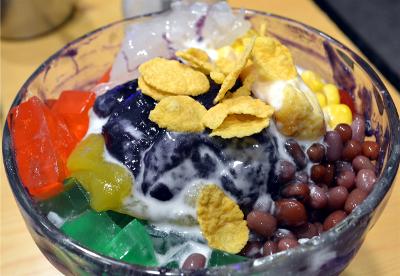Who doesn’t like sugar? Aside from making foods like cakes, pastries, chocolates, and soft drinks taste so good, they also make us feel good.
Studies have shown that consuming simple carbohydrates (like sweets) boosts the neurotransmitter serotonin, a type of chemical that helps relay signals from one area of the brain to another thus helping improve mood. Stress reduces serotonin levels, which may help explain why some people reach for sweets when they’re feeling stressed.
“Sugar taps into a powerful human preference for sweet taste,” points out Dr. Marcia Pelchat, a scientist at the Monell Chemical Senses Center, a basic research institute in Philadelphia. “We’re born to like sugar,” she adds.
“Sugar does seem to be special in some ways,” says Dr. Pelchat – even in the womb. Doctors used to treat the problem of excessive amniotic fluid by injecting a sweet substance into the liquid, she says. The appealing taste would prompt the fetus to swallow more fluid, which was then flushed out through the umbilical cord and the mother’s kidneys.
“Sugar was once a luxury ingredient reserved for special occasions,” wrote Tiffany O’Callaghan, an editor in the Opinion section at New Scientist. “But in recent years it has become a large and growing part of our diets. If you eat processed food of any kind, it probably contains added sugar. You can find it in sliced bread, breakfast cereals, salad dressings, soups, cooking sauces and many other staples. Low-fat products often contain a lot of added sugar.”
Just like salt, eating too much sugar is doing us no good. As a matter of fact, sugar is being touted as public health enemy number one: as bad if not worse than fat, and the major driving force behind obesity, heart disease and type II diabetes. Some researchers even contend that sugar is toxic or addictive.
It is no wonder why health bodies are waging “a war on sugar.” The Geneva-based World Health Organization (WHO) wants people to cut sugar consumption radically. In the United States, doctors and scientists are pressing food companies to reduce sugar and be more open about how much they add. In the United Kingdom, a group called Action on Sugar has just launched a campaign to ratchet down sugar.
But is sugar really that bad?
Sugar, used to be called “white gold,” is the generalized name for a class of chemically-related sweet-flavored substances, most of which are used as food. They are carbohydrates, composed of carbon, hydrogen and oxygen. There are various types of sugar derived from different sources. Simple sugars are called monosaccharides and include glucose (also known as dextrose), fructose and galactose.
The table or granulated sugar most customarily used as food is sucrose, a disaccharide (in the body, sucrose hydrolyzed into fructose and glucose). Other disaccharides include maltose and lactose. Chemically-different substances may also have a sweet taste, but are not classified as sugars. Some are used as lower-calorie food substitutes for sugar described as artificial sweeteners.
Mounting evidence suggests that flooding your system with sugar-sweetened beverages – such as soft drinks, fruit drinks, iced tea and sports drinks – may increase your risk of diabetes.
A recent study published in the journal Diabetes Care examined more than 310,000 patients and found that those who drank 1-2 servings of the sweet stuff a day were 26% more likely to develop type 2 diabetes than those who drank it once a month or not at all.
“The reason is twofold: Loading up on sugar-sweetened beverages tends to lead to weight gain, which is a risk factor for diabetes,” writes Dr. Jacob Teitelbaum, author of Best Sugar Addiction Now! “Previous studies have found that those who toss back high-calorie drinks tend not to cut calories elsewhere from their meals. Second, sugar-loaded drinks deliver a quick rush of sugars to your body, which over time can lead to insulin resistance and inflammation.”
Gary Taubes, in an article which appeared in The New York Times, noted: “In 1924, Haven Emerson, director of the institute of public health at Columbia University, reported that diabetes deaths in New York City had increased as much as 15-fold since the Civil War years, and that deaths increased as much as fourfold in some U.S. cities between 1900 and 1920 alone. This coincided, he noted, with an equally significant increase in sugar consumption — almost doubling from 1890 to the early 1920s — with the birth and subsequent growth of the candy and soft-drink industries.”
Eating too many foods high in sugar may depress your immune system. Dan Hammer, writing for the smoothie-handbook.com, explains: “Your body uses white blood cells to destroy viruses and bacteria. In the 1970s, researchers discovered that vitamin C was needed by the white blood cells to aid them in the process of destroying viruses and bacteria. Researchers developed a ‘phagocytic index’ which tells them how rapidly a particular macrophage or lymphocyte can gobble up a virus, bacteria, or cancer cell to destroy it. Dr. Linus Pauling realized that white blood cells need a high dose of vitamin C to effectively do their job in protecting you.”
Sugar, in the form of glucose, has a similar chemical structure to vitamin C. “As your glucose levels increase,” Hammer says, “this molecule competes with vitamin C to enter the cell. If there is more glucose present, then there will be less vitamin C allowed into the cell. Unfortunately, it doesn’t take much glucose for this disruption to occur. A blood glucose level of 120 reduces the ‘phagocytic index’ by 75%!”
Eating an excessive amount of fat isn’t the only thing that increases your risk of heart disease. “A diet rich in sugar can also hurt your heart,” points out Emily G.W. Chau, an American health journalist. In fact, some studies found that sugar plays a direct role on the health of your ticker.
A study published in the Journal of the American Medical Association found that people who took in more than 17.5% of their calories from added sugars were 20-30% more likely to have high levels of triglycerides, a type of fat that’s found in your blood. When you consume more sugar than you need for energy, the excess sugars form triglycerides, which are then stored in fat cells.
The same study found that people who got 25% or more of their calories from added sugars were more than 3 times more likely to have low levels of HDL (the good cholesterol that helps prevent plaque buildup by carrying cholesterol from your arteries to your liver where it is then excreted) than those whose diets included less than 5% sugar. Both high triglycerides and low HDL levels contribute to atherosclerosis – the hardening of your arteries – a condition that increases your risk of heart disease, stroke, and heart attack.
“If God hadn’t meant for us to eat sugar, he wouldn’t have invented dentists,” said Ralph Nader, an American activist and author. But Luc Tappy, a physiologist at the University of Lausanne in Switzerland, disagrees: “You cannot live without essential fats. You cannot live without protein. It’s going to be difficult to have enough energy if you don’t have some carbohydrate. But without sugar, there is no problem. It’s an entirely dispensable food.”







